Educator Resources for Cell Biology Flipped Course
The Cell Biology Flipped Course is built around a model where students watch iBiology videos as homework, with assignments to guide them, and then use classroom time for in-depth discussions and problem-based learning. The Cell Biology Flipped Course was first developed in collaboration with Professor Jonathan Scholey at the University of California – Davis and offered in 2013 to senior undergraduate biology majors. It was offered again in the spring of 2019 by UC Davis Professors Kassandra Ori-McKenney and Rick McKenney. Below, you will find all of the course materials including the seminars, discussion questions, and assignments.
Educator Testimonial
| Title | Video | Concepts | Duration | Video Downloads | Transcript | PDF Resources (Educators Only) |
|---|---|---|---|---|---|---|
|
Session 1: Origins of Life
Jack Szostak discusses the origin of life on earth and the components of a simple protocell. With: Jack Szostak |
All Course Materials for this Session (Educators only) – Created by Jack Szostak |
|||||
| The Origins of Life on Earth | 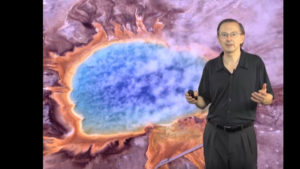
|
Emergence of life, conditions that support life, self-replicating protocell | 54:40 |
Hi-Res Subtitled: |
View Transcript | |
|
Session 2: Organization of Cytoplasm
Anthony Hyman explains what is known about the organization of the cytoplasm, complex structures, processes, and compartments. With: Anthony Hyman |
All Course Materials for this Session (Educators only) – Created by Tony Hyman |
|||||
| Organization of Cytoplasm | 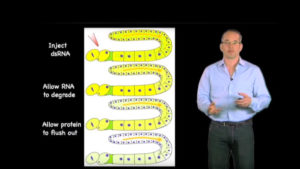
|
Cell division, RNA interference, cellular organization | 27:57 |
Hi-Res Subtitled: |
View Transcript | |
|
Session 3: G-Proteins
Alfred Wittinghofer discusses experiments that led to the mechanistic understanding of how G-proteins can act as switches. With: Alfred Wittinghofer |
All Course Materials for this Session (Educators only) – Created by Alfred Wittinghofer |
|||||
| GTP-binding Proteins as Molecular Switches | 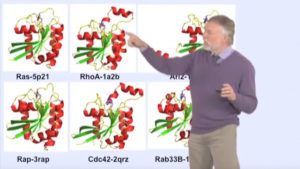
|
Cell growth, growth factor, GTP-binding protein, RAS pathway | 42:01 |
Hi-Res Subtitled: |
View Transcript | |
| GTPase Reactions and Diseases | 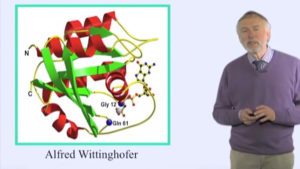
|
Link between GTPases and disease, cancer cell growth | 55:01 |
Hi-Res Subtitled: |
View Transcript | |
|
Session 4: Vesicle Trafficking
Randy Schekman gives an overview of the secretory pathway, including protein secretion and vesicle trafficking. With: Randy Schekman |
All Course Materials for this Session (Educators only) – Created by Randy Schekman |
|||||
| The Secretory Pathway: How Cells Package and Traffic Proteins for Export | 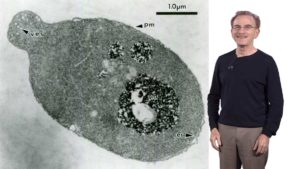
|
Secretory pathway, extracellular vesicles, endoplasmic reticulum, Golgi Apparatus, vesicle fusion, vesicle trafficking | 35:00 |
Hi-Res Low-Res Subtitled: |
View Transcript | |
| Genes and Proteins Required for Secretion | 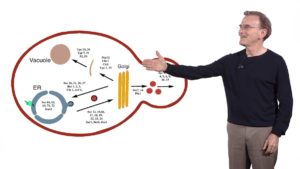
|
Secretory pathway, budding, vesicle trafficking, and vesicle fusion | 38:29 |
Hi-Res Low-Res Subtitled: |
View Transcript | |
|
Session 5: Cell Motility
Julie Theriot describes a thermodynamic model that proposes a mechanism for cell motility. With: Julie Theriot |
All Course Materials for this Session (Educators only) – Created by Julie Theriot |
|||||
| Protein Polymers, Crawling Cells and Comet Tails | 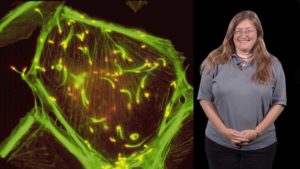
|
Filamentous actin, actin polymerization, cell motility | 28:53 |
Hi-Res Low-Res Subtitled: |
View Transcript | |
|
Session 6: Cytoskeletal Motor Proteins
Ron Vale discusses how cytoskeletal motor proteins are fascinating enzymes that power much of the movement performed by living organisms. With: Ron Vale |
All Course Materials for this Session (Educators only) – Created by Ron Vale |
|||||
| Molecular Motor Proteins | 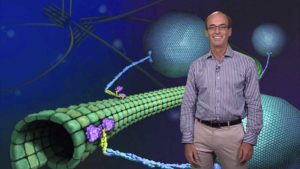
|
Molecular motor protein structure and function | 35:25 |
Hi-Res Low-Res Subtitled: |
View Transcript | |
| The Mechanisms of Dynein Motility | 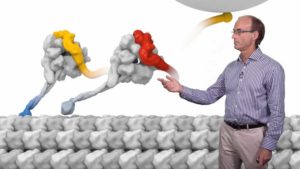
|
Dynein movement along microtubules | 39:36 |
Hi-Res Low-Res Subtitled: |
View Transcript | |
|
Session 7: Cell Division
Richard McIntosh talks about the problems that cells face in eukaryotic cell division and describes some of the ways cells solves them. With: Richard 'Dick' McIntosh |
All Course Materials for this Session (Educators only) – Created by Richard McIntosh |
|||||
| Separating Duplicated Chromosomes | 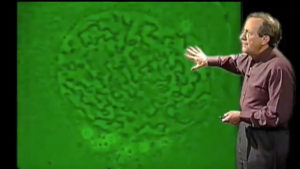
|
Cell division, chromosome segregation, mitotic machinery | 29:33 |
Hi-Res Subtitled: |
View Transcript | |
| Understanding Mitosis through Experimentation | 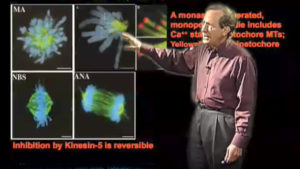
|
Mitotic spindle dynamics, chromosome attachment to spindle, mitotic motors, chromosome segregation | 39:02 |
Hi-Res Subtitled: |
View Transcript | |
| Moving Chromosomes to the Spindle Poles: the Mechanisms of Anaphase A | 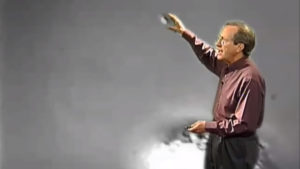
|
Microtubule depolymerization, chromosome-microtubule linkages | 41:26 |
Hi-Res Subtitled: |
View Transcript | |
|
Session 8: Protein Kinases
In this seminar, Susan Taylor gives an overview of the structure and function of protein kinases. With: Susan Taylor |
All Course Materials for this Session (Educators only) – Created by Susan Taylor |
|||||
| Protein Phosphorylation in Biology | 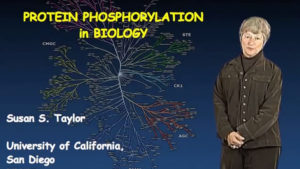
|
Protein kinase structure and function, PKA enzyme superfamily | 23:06 |
Hi-Res Subtitled: |
View Transcript | |
| Architecture of a Protein Kinase | 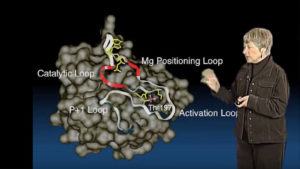
|
Protein kinase structures | 28:14 |
Hi-Res Subtitled: |
View Transcript | |
|
Session 9: Cell Cycle
In this seminar, David Morgan provides a general overview of the cell-cycle control system. With: David Morgan |
All Course Materials for this Session (Educators only) – Created by David Morgan |
|||||
| Controlling the Cell Cycle: Introduction | 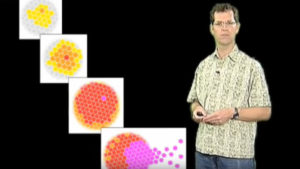
|
Cell cycle, cell-cycle control system, cell division | 28:30 |
Hi-Res Subtitled: |
View Transcript | |
| Cdk Substrates | 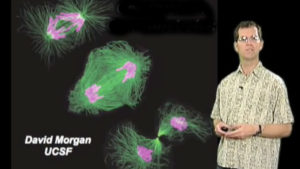
|
Cyclin-dependent kinases | 30:07 |
Hi-Res Subtitled: |
View Transcript | |




